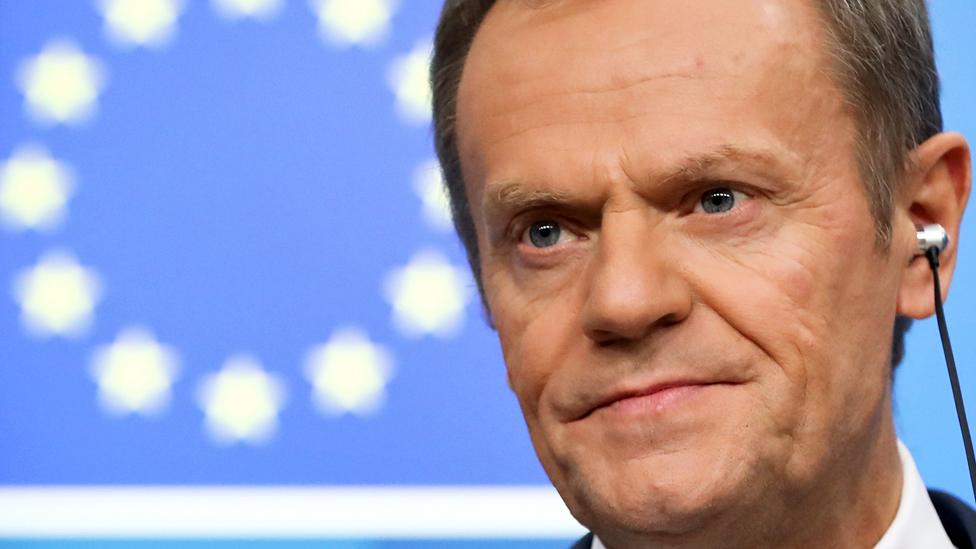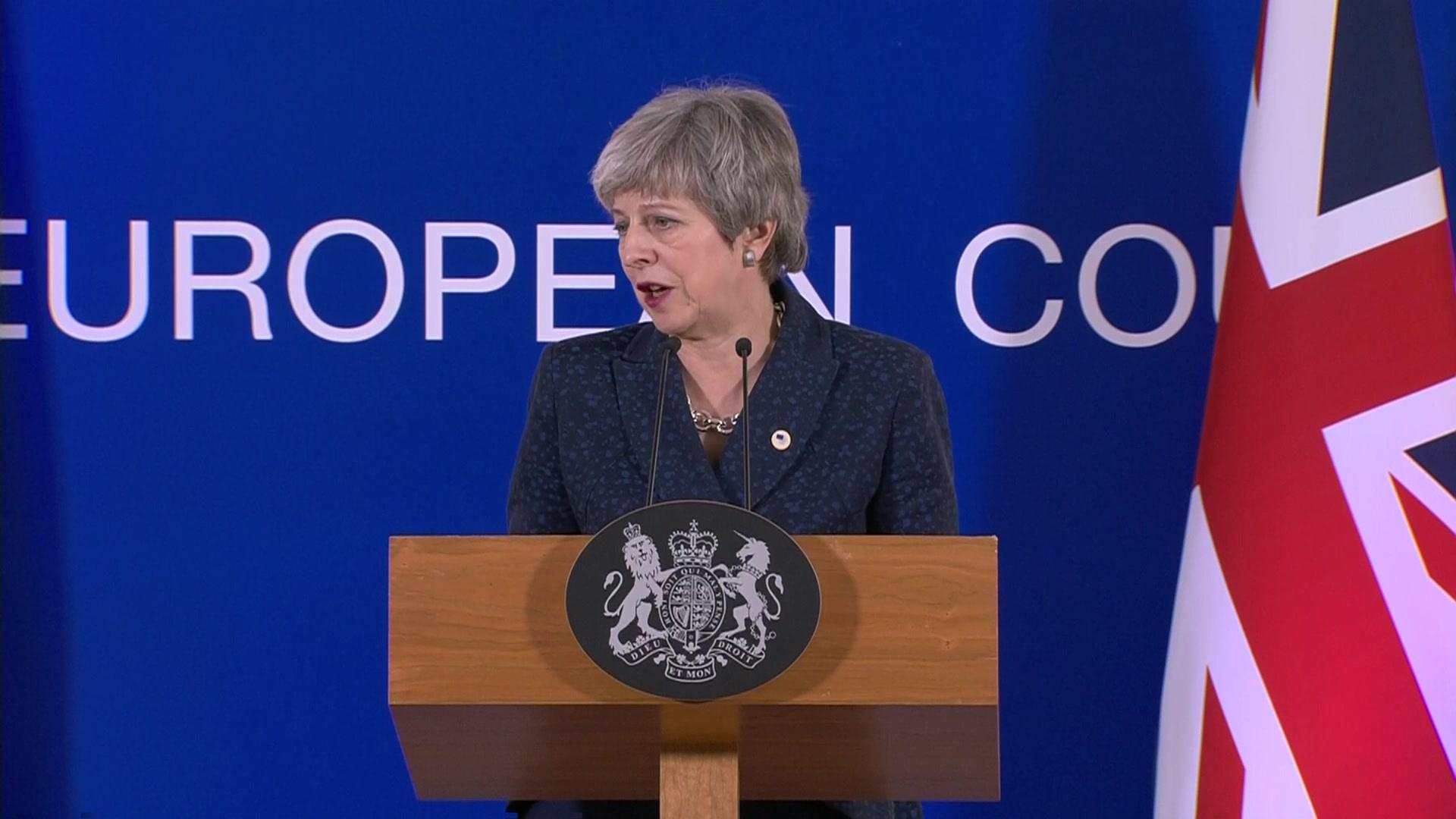Brexit's fate 'is in British hands', says Donald Tusk
- Published
- comments

Brexit's fate is "in the hands of our British friends" after EU leaders agreed to delay the departure date by at least two weeks, says Donald Tusk.
If MPs approve Theresa May's withdrawal deal next week, Brexit would be delayed from 29 March until 22 May.
But if they do not, the UK has until 12 April to come up with a new plan.
European Council President Mr Tusk said that until 12 April, "anything is possible" including a much longer delay or cancelling Brexit altogether.
Speaking in Brussels on Friday, he said he was "really happy" the 27 EU leaders had reached a unanimous decision to extend the two-year Article 50 process, under which the UK was due to leave the EU next Friday.
"It means that until 12 April, anything is possible: a deal, a long extension if the United Kingdom decided to rethink its strategy, or revoking Article 50, which is a prerogative of the UK government.
"The fate of Brexit is in the hands of our British friends. As the EU, we are prepared for the worst, but hope for the best. As you know, hope dies last."
According to the final summit conclusions, external, the UK is expected to "indicate a way forward" before 12 April, if MPs do not approve the withdrawal deal negotiated with the EU, which would then be considered by the European Council.


Theresa May has been granted a little breathing space. The EU has allowed a few more days to try to get her deal through the House of Commons.
But it's not the timetable that she chose.
And as things stand, the expectation that the compromise deal will get through is low.
And, more to the point, the government does not believe that it can hold off another attempt by a powerful cross-party group of MPs who are resolved to put Parliament forcibly in charge of the process to find alternatives.
Ministers are therefore today not just wondering about how to manage one last heave for the prime minister's deal, but what they should do next, when - odds on - the whole issue is in the hands of the Commons, not Number 10.

The UK must decide by then whether it will be taking part in European Parliamentary elections from 23-26 May - if it does not, then a long delay would become "impossible", Mr Tusk said.
On Friday, Mrs May's deputy David Lidington met opposition parties to discuss how MPs could vote on alternatives to the government's Brexit plan next week.
These could include options such as holding another referendum, leaving with no deal or pursuing a closer economic arrangement such as the "Common Market 2.0" plan.
MPs are expected to vote on Mrs May's deal for a third time next week, despite Commons Speaker John Bercow ruling that it could not be brought back for another vote without "substantial" changes.
But in a letter to all MPs on Friday evening, Mrs May said it was possible a third vote on the deal may not take place "if it appears there is not sufficient support to bring the deal back next week".
The prime minister offered to talk to MPs over the coming days "as Parliament prepares to take momentous decisions".
She also referred to her televised address on Wednesday, in which she blamed the delay to Brexit on MPs.
Mrs May acknowledged that "a number of colleagues had raised concerns" about her words and it had not been her intention to make a their "difficult job... any more difficult".
Earlier, Business Secretary Greg Clark told the BBC that if they do not back Mrs May's deal, then the government would give Parliament the means to express their views on a series of other options.
He said this meant an attempt by a cross-party group to enable MPs to take control of Commons business, so they can get indicative votes, would not be necessary.
But he said the government's ambition should be to try to build as big a consensus as possible on Brexit, rather than simply "getting it over the line" with a slim majority of one or two votes.

Timeline
29 March: Current Brexit date in UK law
12 April: If MPs do not approve the withdrawal deal next week - "all options will remain open" until this date. The UK must propose a way forward before this date for consideration by EU leaders
22 May: If MPs do approve the deal next week, Brexit will be delayed until this date
23-26 May: European Parliamentary elections are held across member states

Mrs May has ruled out revoking Article 50, which would cancel Brexit, and has said it would be wrong to ask Britons to vote for candidates for the elections to the European Parliament, due to be held from 23-26 May, three years after they voted to leave the EU.
Her official spokesman said: "There is now a clear point of decision. If we are able to have a successful vote next week then we can pass the necessary legislation for ratifying the agreement and we can, as a country, be outside the European Union two months today."
For now, the UK's departure date is still written in to law as next Friday, 29 March.
But Mrs May is expected to change that by tabling legislation next week and getting it through the Commons and the Lords.
The withdrawal deal sets out the terms of the UK's departure from the bloc, including the "divorce bill", the transition period, citizens' rights and the controversial "backstop" arrangements, aimed at preventing a return to border checks between Northern Ireland and the Republic of Ireland.
But it must be approved by UK MPs, who have already rejected it twice by large margins.
The Irish premier Leo Varadkar said the choices were now obvious: "It's this agreement, no deal, or the parliament taking indicative votes for a much closer long-term relationship with the EU."
But Nigel Dodds, deputy leader of the DUP - whose votes Mrs May relies on to support her minority government - said the prime minister had "missed an opportunity" to propose changes to the withdrawal agreement to help get it through the Commons.
"The prime minister has now agreed with the EU to kick the can down the road for another two weeks and humiliatingly revoke her oft-stated pledge that the UK would leave the EU on 29 March," he said.
"Nothing has changed as far as the withdrawal agreement is concerned."

- Published22 March 2019

- Published22 March 2019